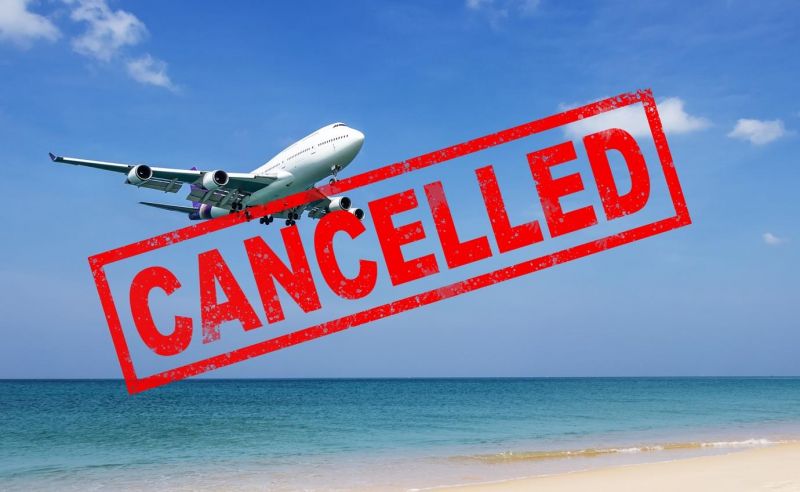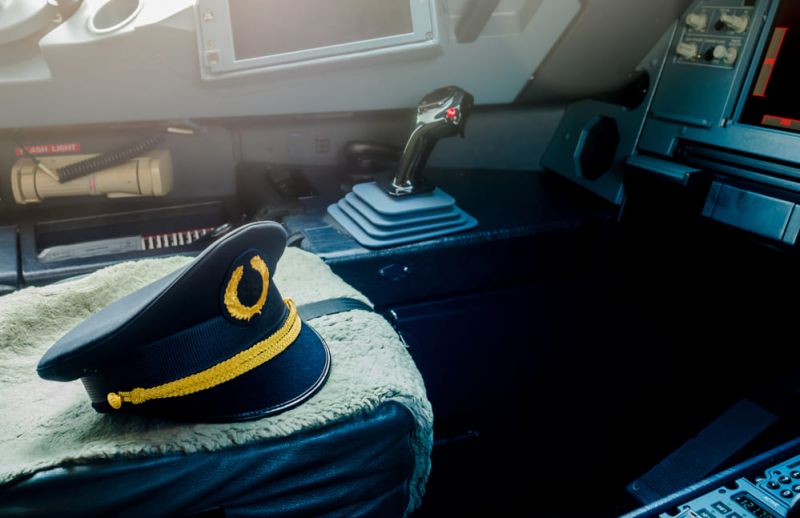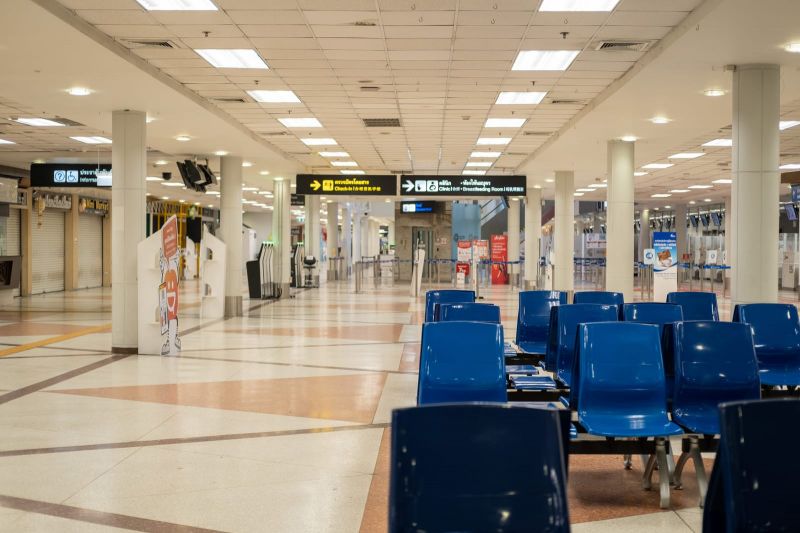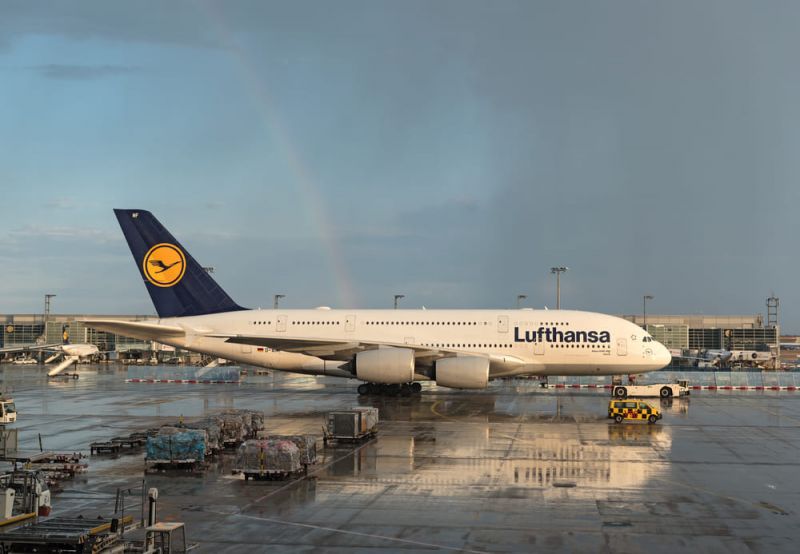My partner had his quanta’s flight cancelled, so got on Jetstar and that got cancelled. He needs to get to Sydney to catch a connecting flight and won’t make it back to work on time. What is going on and how does he seek compensation for lack of pay and out of pocket expenses ?

Why Are Airlines Cancelling Flights – Top 10 Reasons
If you’re like most people, you’ve experienced at least one cancelled flight during your travels. In fact, the US Department of Transportation says that there were 16.3 million cancelled flights in 2023 alone.
But what causes so many cancellations? The answer is that a flight can be cancelled for many reasons: Some are within the airline’s control and others are caused by extraordinary circumstances. So, to better answer the question, “Why are airlines cancelling flights?” we’re going to take a close look at the top 10 reasons as well as the impact they have on the industry and passengers.

1. Dangerous Weather
Severe weather can lead to cancellations, but we’re not just talking about a little rain or snow. When a flight is cancelled because of weather, you can trust that the situation is dangerous enough to warrant the cancellation.
Sometimes, with thunderstorms and high wind situations, an airline will opt to delay a flight until the situation has become more safe for flight, but in other cases, an airport and airline has no choice but to ground flights, sometimes on a large scale.
But you might be wondering how weather can still have such a huge impact on flights when we have so much technology available to us. Well, here’s why. Severe weather conditions can affect a pilot’s ability to take off, land, and navigate the aircraft safely as with low visibility due to fog. Similarly, heavy rain or snow can prevent the pilot from seeing the runway.
In other situations, a flight might be cancelled in Florida because of a snowstorm in Canada leaving passengers confused as to why their flight was cancelled when they were only flying to another warm location. With roughly 45,000 flights in operation every day in the US, a snowstorm that affects one airport can result in a cascade of delays and cancellations all over the country and even around the world in some cases.
2. Security Concerns
Airline security is always a top priority for airlines and regulatory authorities around the world. Various security measures are in place to ensure passengers' and crew members' safety, but these measures can sometimes lead to flight cancellations.
Enhanced security screenings are a major cause of flight disruptions, so if a passenger's bag triggers an alarm during the security screening process, the bag may need to be searched manually which means the flight can’t depart until this has been completed.
Another example is when an unruly passenger refuses to comply with the instructions from the crew. If the situation continues for too long and security has to remove the passenger, the flight might be cancelled as a result. Other security situations can include wildfires, civil unrest, a security breach in the airport, and any threats to security. Any credible threat to the safety of the airline and passengers may result in a cancelled flight.

3. Tight Flight Schedule
Passengers don’t always see what’s going on between flights, but a flurry of activity goes into play every time a plane lands. It’s not like getting on or off a bus. When a plane lands and the passengers disembark, there is a very short period of time for the aircraft to be cleaned and re-fueled, not to mention unloading baggage from one flight and stowing baggage for the next.
So, if a flight is delayed, this time period is shortened. If there are cumulative delays, then there is almost no turn-around time to prepare for the next departure. In fact, if there are multiple delays throughout the day, then the last flight might be cancelled. The situation can be exacerbated when these tight schedules and delays cause the crew to also be late, but we’ll talk more about that later.
If your flight was delayed, canceled or overbooked within the last 3 years, you could be eligible for up to €600 ($650) in compensation.Check Your Flight
4. No Airplane
Aircraft undergo regular maintenance and safety checks to ensure that they are safe to operate, but unforeseen mechanical issues can still occur - and, let’s face it, as inconvenient as a cancellation might be, no one wants to risk flying on a plane that could be unsafe. So, if an aircraft is grounded due to maintenance issues, the airline will need to call for another aircraft which might be the one intended for a later flight.
Moreover, a high demand for air travel during peak travel periods can also lead to airlines cancelling flights. Most airlines keep a set number of aircraft in their fleet, and during peak travel periods, such as holidays or summer vacation, the demand for air travel can exceed the number of available aircraft. When this situation occurs, it can lead to flight cancellations.
5. Not Enough Passengers

Passenger shortages can occur for several reasons including seasonal demand and economic conditions. When an airline doesn't have enough passengers for a particular flight, they may consider cancelling it or consolidating it with another flight to save money and resources. Airlines operate on tight schedules and have to maintain a certain level of profitability to remain operational.
So, operating a flight with too few passengers can lead to a financial loss for the airline, as the cost of operating the flight, such as fuel, crew salaries, and airport fees, may exceed the revenue generated by the passengers.
6. Air Traffic Restrictions
Delays caused by air traffic control and staff shortages significantly impact airline operations, leading to flight cancellations. Air traffic control is responsible for managing the flow of aircraft in the airspace, and when the number of flights exceeds the capacity of the airspace, they impose restrictions on the number of flights that can operate.
When they impose this restriction, airlines must adjust their flight schedules to comply with them. This adjustment typically involves rerouting flights, changing departure times, or cancelling flights altogether.
.jpg)
7. Technical Problems
While mechanical issues with an aircraft can affect cancellations, technical or computer problems can create even more trouble. In January 2023, the FAA computer system failed and resulted in the grounding of planes all over the US. But technical issues stemming from scheduling software or communication technology can also lead to flight cancellations. With technology becoming more and more central to flight operations, we can only expect that this will be an issue we see more of in the future.
8. Lack of Pilots or Staff
Airlines rely on a large number of personnel to operate their flights, including pilots, flight attendants, ground crew, and maintenance staff. If there are not enough personnel available, it can lead to airlines cancelling flights.
Staff shortages can occur because of illness, strikes, or other delays and cancellations. Sometimes, a pilot and/or crew must go from one aircraft to the next, and if their first flight was delayed or cancelled, it can lead to the same happening with flights later in the day. With airline personnel stretched thin, fatigue and decreased productivity can further exacerbate the problem.
Disrupted flight? You might have a right to compensation - up to €600 ($650).Check Your Flight
9. An Pilot Who is Unwell
If there is one person aboard an aircraft who you want to be in top form, it is the pilot. But, because pilots are people too, they sometimes succumb to illness, fatigue, or any number of circumstances that would make them unable to fly the plane safely. So, if a pilot is deemed ‘unfit to fly’, it can sometimes lead to flight cancellations, especially if there are no available replacement pilots qualified to fly that specific aircraft.
10. Bird Strike
Bird strike is a common occurrence in the aviation industry, and it can lead to flight cancellations. You might be wondering how such a small animal like a bird could create so much havoc with something as big as a plane!
A bird strike occurs when an airplane collides with a bird or flock of birds during takeoff or landing or while in flight. A collision like this can damage the nose, windscreen, or engines and can lead to serious damage that takes a while to repair. So, when this happens, the airline must inspect the airplane before sending it on another flight, and this can cause your flight to be cancelled if another plane isn’t found as a replacement.

What are Your Rights If the Flight Was Cancelled
In most cases, if your flight is cancelled, you have several rights under the law, including the right to compensation. The compensation for cancelled flights varies depending on the circumstances of the cancellation.
Generally, if your flight is cancelled due to reasons within the airline's control, such as a lack of staff or a mechanical issue, you may be entitled to compensation for the inconvenience caused. This compensation can include a refund for the cost of the flight or alternative transportation to your destination.
If you believe you are entitled to compensation, you can send a flight cancellation compensation letter to the airline to request it. It's essential to know your rights when it comes to flight cancellations, and to be proactive in seeking compensation if you believe you are entitled to it. Getting compensation can help alleviate the stress and inconvenience caused by a cancelled flight and make the situation more manageable.
Related: How to Claim Hotel Compensation for Cancelled Flights
Figuring out how much you are owed for a disrupted flight can be complicated. We're here to help. Let us assess your compensation for you.Check Your Flight
Conclusion
So, there you have it. While cancelled flights can be undeniably frustrating, there are usually solid reasons behind why it happened. It’s important to remember though that some cancelled flights are within the airline’s control and other times, the causes are attributed to extraordinary circumstances outside the control of the airline. If the airline had control of the circumstances, in the case of an airline strike, then you could submit a cancelled flight cancellation claim.
If you’ve had a cancelled flight anytime in the last 3 years here is what to do. Not sure if was the fault of the airline or not? You can always check to see if it is eligible for compensation by entering your flight details below!
Frequently asked questions
Why are lots of flights being cancelled?
There are several reasons why flights may be canceled, including bad weather, air traffic restrictions, lack of airplane or staff, technical problems, and low passenger numbers.
Why do airlines just cancel flights?
Airlines may cancel flights due to various reasons, such as safety concerns, technical issues with the airplane, or labor shortages.
What happens if an airline cancels your flight?
If an airline cancels your flight, they are usually required to provide you with an alternative flight or a refund for the cost of the flight. In some cases, the airline may also provide compensation for the inconvenience caused.
Why do airlines keep cancelling flights UK?
There are several reasons why airlines may be canceling flights in the UK, including labor shortages, air traffic restrictions, and bad weather. Additionally, the COVID-19 pandemic has also had a significant impact on the airline industry, leading to many flight cancellations and disruptions.
Leave your feedback
We don’t spam.

